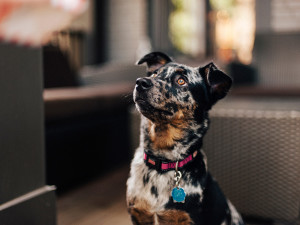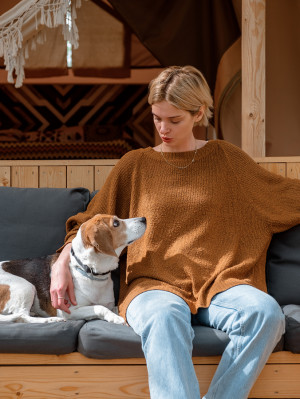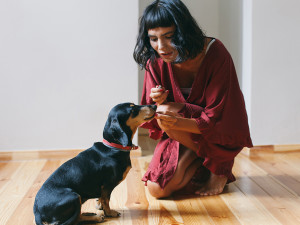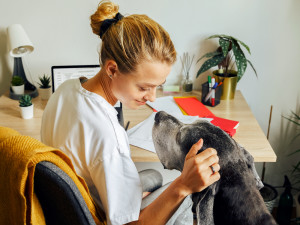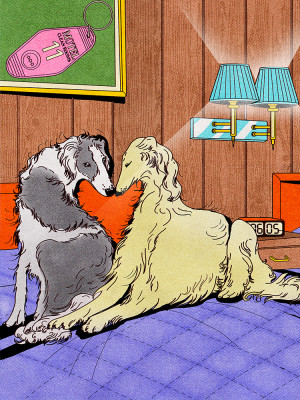Are All Your Silly Nicknames for Your Dog Confusing Them?
I’m baffled by the number of names I call my dog. Is my dog baffled, too?
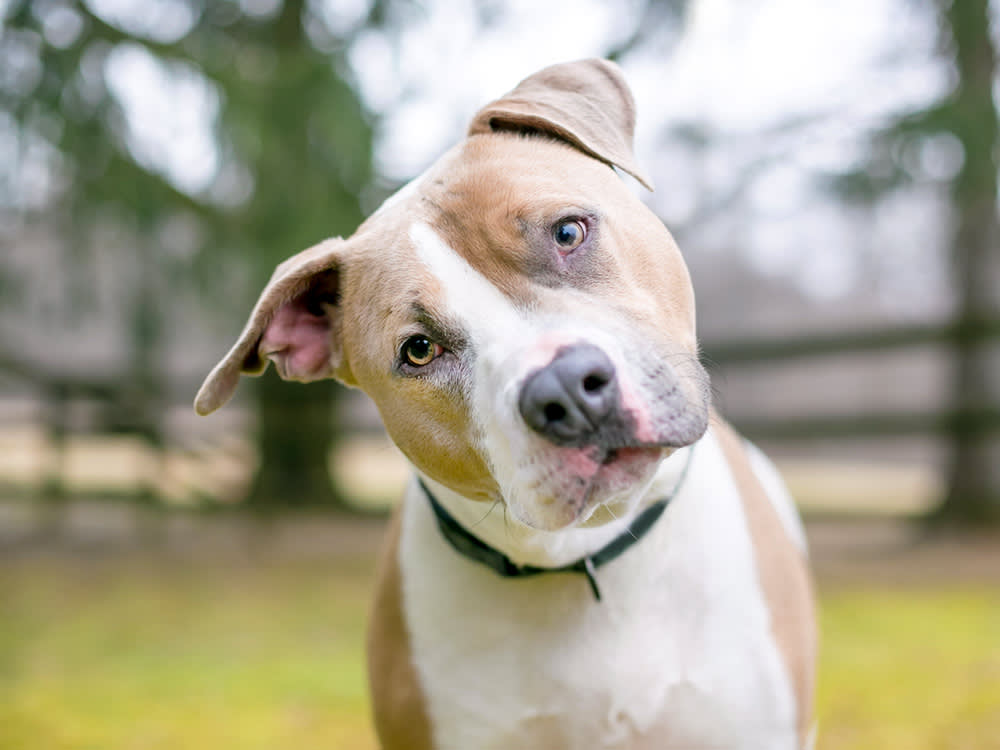
share article

Your pet wants you to read our newsletter. (Then give them a treat.)
Last year, my husband and I adopted a small Terrier. Upon meeting her one dry April day, the name was obvious: Bonnie. She was so clearly and perfectly Bonnie.
I wish that was the end of the story, but the name Bonnie presented an issue. We concluded Bonnie sounded a little too similar to her cousin’s name, Bobbie, and could be confusing at family events, so we tried different names in the first 72 hours she was under our care. We worried over this name. We wrung our hands over it. We discussed alternatives for days. Nothing we could come up with sounded quite as correct as Bonnie.
So it’s especially perplexing that at some point within six months of raising this puppy, Bonnie had become Barney. Then Barney became Barney Mcgillicutty. Then Barney Rubble Troubleopens in a new tab. Soon, Barney morphed into Barneth, or, formally — like if you wanted to address a wedding invitation to her — Barneth K. Abernathy. Sometimes she’s Barnyard; other times, she’s Bernice. Occasionally, depending on the day, the company, and her personality in that moment, she’s Bonchan, Cinnabon, Miss Priss, Little One, Little Rat, or Pig. My mother calls her Bonbon, which I think is strange. What kind of nickname is Bonbon?
At this point, besides a full-stop lobotomy, I don’t think there’s anything that can help my me and my husband. But occasionally, I wonder if we’re confusing the girl. Bonnie is very smart, and listens to us. When we make our demands of her, we try to use her given name to avoid any confusion, but we slip up a lot. What, I wondered, are all these names doing to my poor dog?
What’s in a name?
Before we can articulate how the wrong name affects a dog, we have to establish the reason we give our dogs names in the first place. Dina Casellini, founder, owner, and principal trainer of MindfulPupsopens in a new tab in Brooklyn, New York, told me that names aren’t completely necessary to communicate with our pups.
“Some trainers just use commands,” Casellini says. “They don’t necessarily use the name.”
Yet, naming is a natural human impulse, and can be a useful one. Teaching a dog their name also teaches them to pay attention to youopens in a new tab, Casellini adds, so you can carry out other cues. It’s among the first building blocks ofopens in a new tab dog training. A dog’s name usually cues, “Eyes and ears on me.”
When to call them by their name
Giving a dog a good name foundation while training is especially essential for one very specific reason: emergency situations. In case of emergency, Casellini explains, you want the dog to have an immediate response to their name so you can quickly call them away from dangerous circumstances.
“When it comes to any of the life-saving skills, we really want to make sure that we practice with clarity,” Casellini says. She recommends using the exact same name, command, and tone each time.
“You have to rehearse multiple times, not just wait until the emergency moment to call upon that practice,” Casellini adds.
Likewise, in a group-training space or multi-dog households, naming becomes a more crucial piece of the communication puzzle. “If we open the door, and we don't want six dogs to run through at the same time, we will ask the dogs to wait, we will open the door, and then we will call the designated dog [by name],” Casellini says.
She advises against naming dogs in a single household similar names to avoid confusion, but it’s not an insurmountable obstacle if a Bonnie and a Bobbie, for example, shared living space. In the event that she has, say, three “Lunas” in a class, she uses eye contact and body language to communicate which Luna she’s talking to.
Alana Stevenson, a dog and cat behaviorist who trains dogs across New Englandopens in a new tab, likewise suggests avoiding similar-sounding names.
“Most non-human animals have a sense of hearing that is far superior to ours,” Stevenson says. “Dogs with nearly identical names may eventually learn the nuances in your voice to differentiate between themselves, but when strangers or others say their names, they won’t have that same familiarity.” He purposely picks names that do not sound similar when he's choosing names for animals. “For multiple dogs, I pick a ‘group’ name to call all dogs and teach that to my clients,” he says.
It’s as much how you say it as what you say
Researchers have begun to explore so-called “genius” dogs for whom language acquisition comes more naturally than others. A recent studyopens in a new tab showed that some dogs are capable of learning words for their toys through a vocabulary acquisition test (VAT). While the study was not able to establish whether this was a product of nature or nurtureopens in a new tab, the thing to remember is that there are dogs who are capable of learning names for various toys, commands, etc., and that bodes well for dog’s apprehending their various nicknames. Still, for most dogs, the accepted wisdom is that when you’re communicating with them, tone and body language matter as much, if not more, than a word itself.
As Stevenson puts it, “Most animals become comfortable with tones, noises, and sounds, not necessarily the word itself. So, if another person said the same word, most animals wouldn’t associate with it. Likewise, if someone is constantly yelling at the animal, repeating the animal's name over and over again as replacement for any interactions or redirections, then the animal will ignore what the person is saying.”
If you tend to recall a dog by saying their name in a high-pitched voice and clap, then they will infer that you want them to come. If you use the same tone and body language to call a dog who is officially named “Charlie,” let’s say, but shout, “Pizza,” or “Donkey,” or “Tony Soprano,” then Charlie will often still respond to the context clues you’ve offered.
Think of a dog’s speech acquisition like your own. If you’re in a country where you don’t speak the language well, you’re going to learn to recognize a few words and pay more attention to body language than you would if you’re totally fluent.
Nickname to your heart’s content in most situations
Cassenili adds that a lot of what we say is just “white noise” to our pets. In training, usually the fewer words you use, including nicknames, the better. But outside of training, it matters less because they’re likely not paying that close attention to your literal words.
“It’s a human thing to make nicknames. It’s fun,” Casenelli says. “We love to have fun with our dogs.” Outside of emergency situations, it’s fine to call a pup whatever comes to mind. “If [you’re] just giving cuddles from the other room, you can say whatever you want.”
In those moments, the pups probably won’t be confused. In fact, Bonnie-Barney-Bernice-Bonatron-Barneth-Cinnebon-Bonbon probably won’t register her nickname(s) at all.
Julia Johnston
Julia Johnston is a freelance writer who lives with her dog, Bonnie, in Brooklyn.
Related articles
![Short-haired blonde woman in a tan sweater and blue jeans sitting on a bench talking to her Beagle mix dog who is looking up at her]() opens in a new tab
opens in a new tabHow You Say Something to Your Dog Matters More Than What You Say
TikTok pet parents have made this clear: Tone matters. Celebrity dog trainer Nicole Ellis says dogs can hear “stress in our voice — whether directed at them or when they hear us talking to others.”
![woman gives small black dog treat for sitting]() opens in a new tab
opens in a new tabYour Dog Should Do This 30-Day Training Challenge
It’s like your 30-day yoga challenge — except with way more training treats.
![]()
What Are Dog Communication Buttons? And How to Use Them
Cognitive Science professor Dr. Federico Rossano on how Bunny, TikTok’s “talking” dog, is sparking change in how we communicate with our pets.
![Young woman sitting at desk petting her senior Great Dane]() opens in a new tab
opens in a new tabHow to Speak “Dog”
Lili Chin’s book Doggie Language illustrates how dogs communicate — beyond ear perks and tail wags.
![An illustration of 2 dogs on a bed]() opens in a new tab
opens in a new tabThree’s a Crowd: When One Partner Doesn’t Want the Dog in the Bed
You want them to cuddle up, your S.O. doesn’t. Here’s how to handle the great bed debate.

